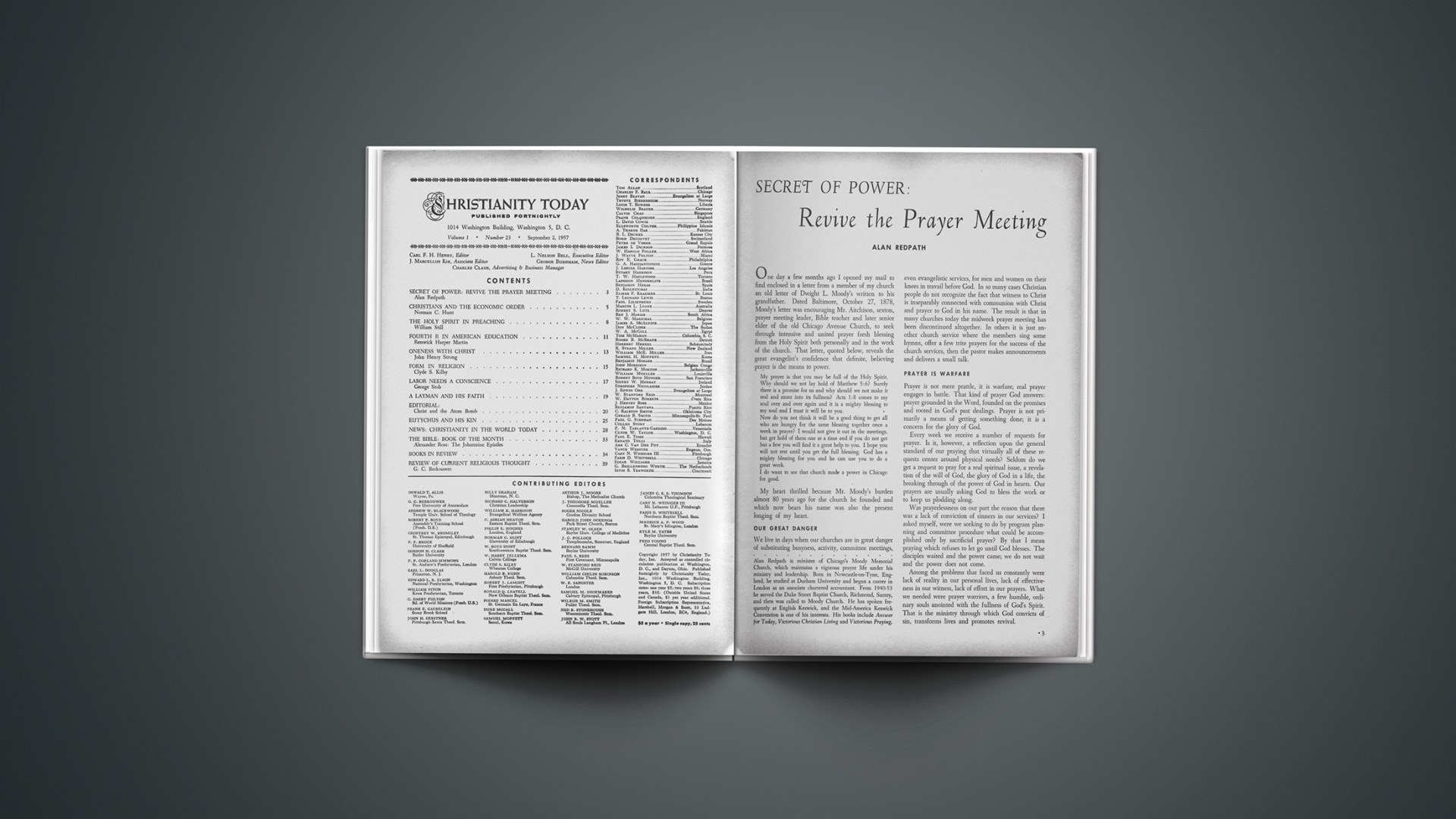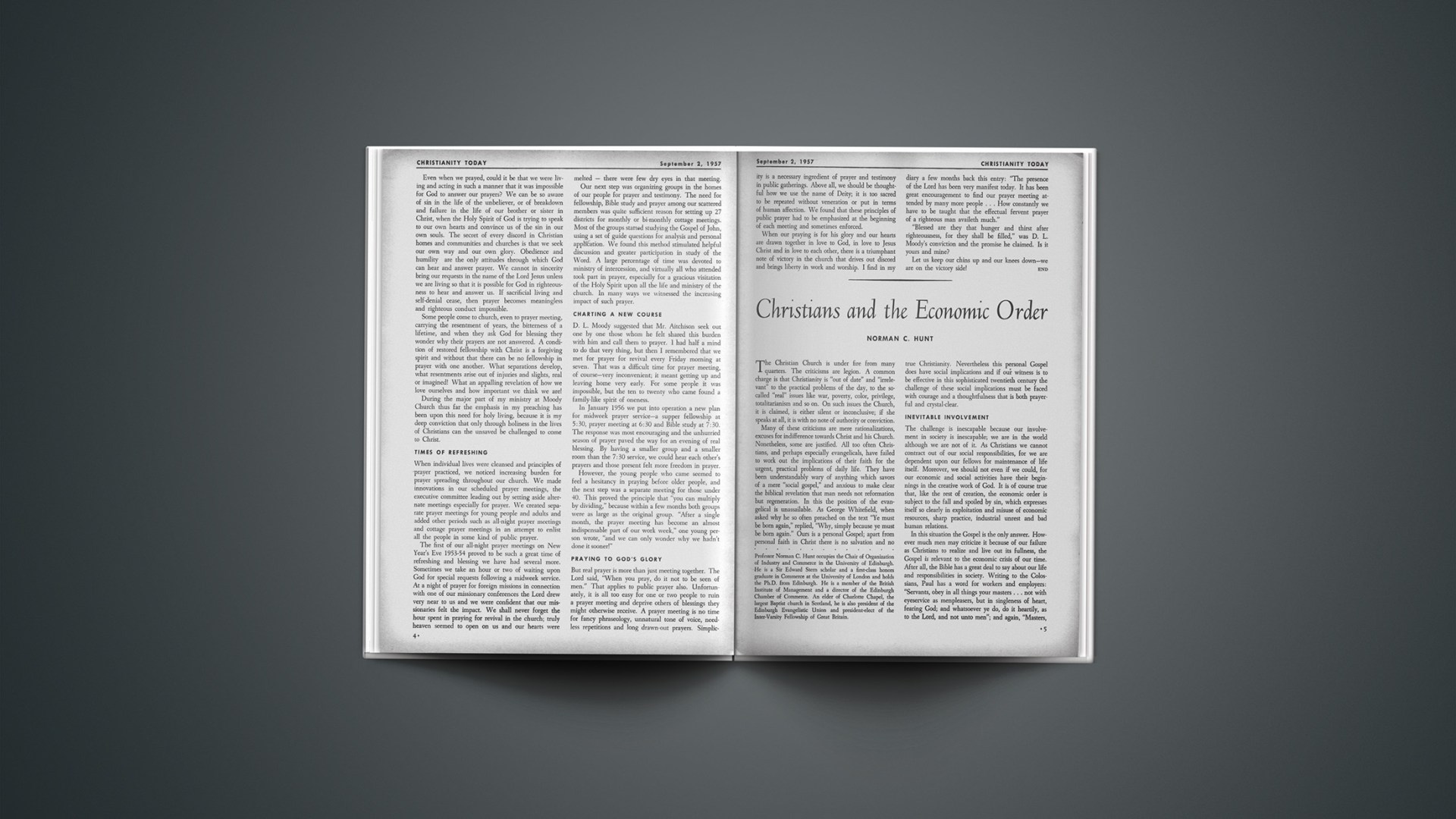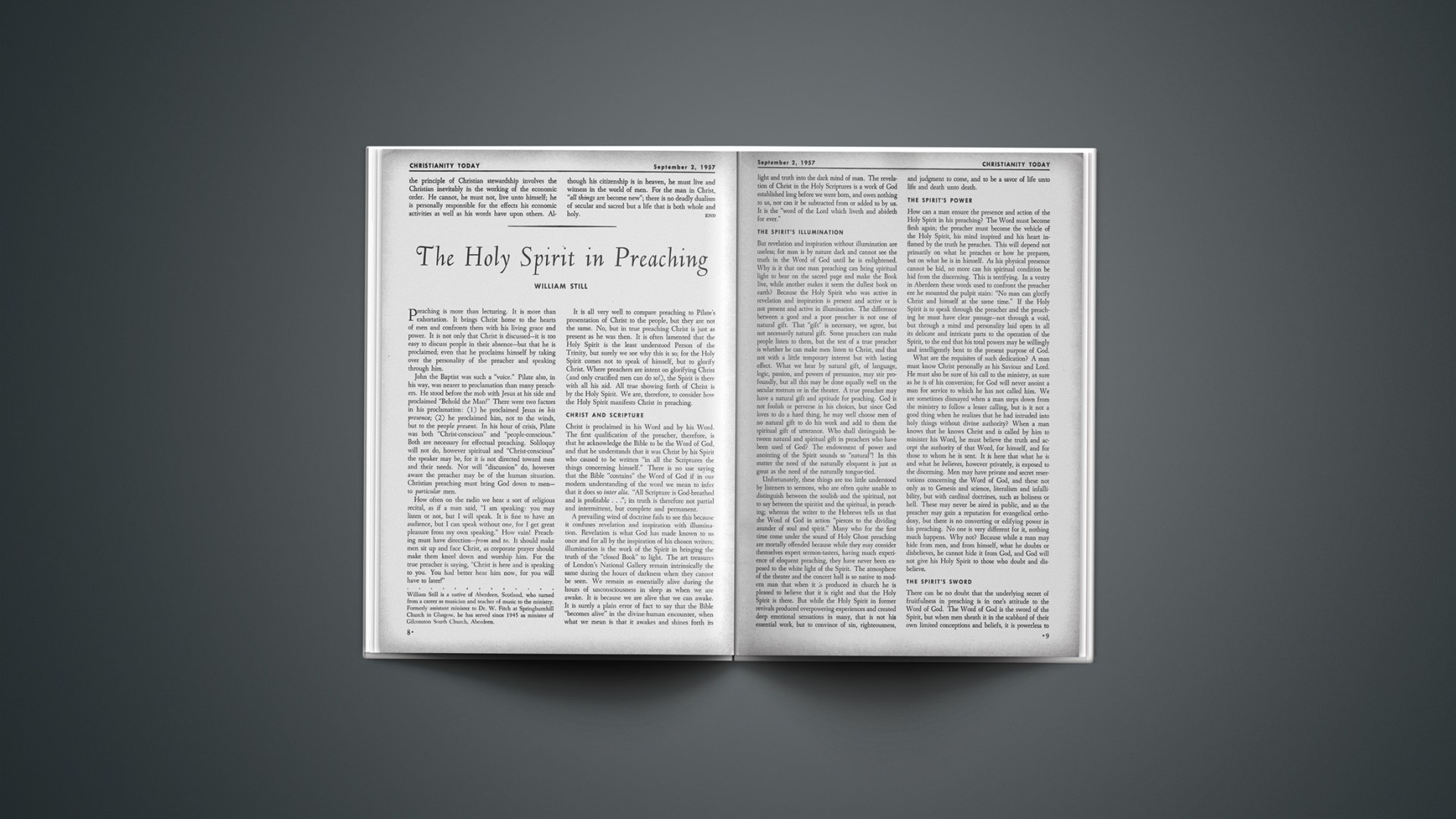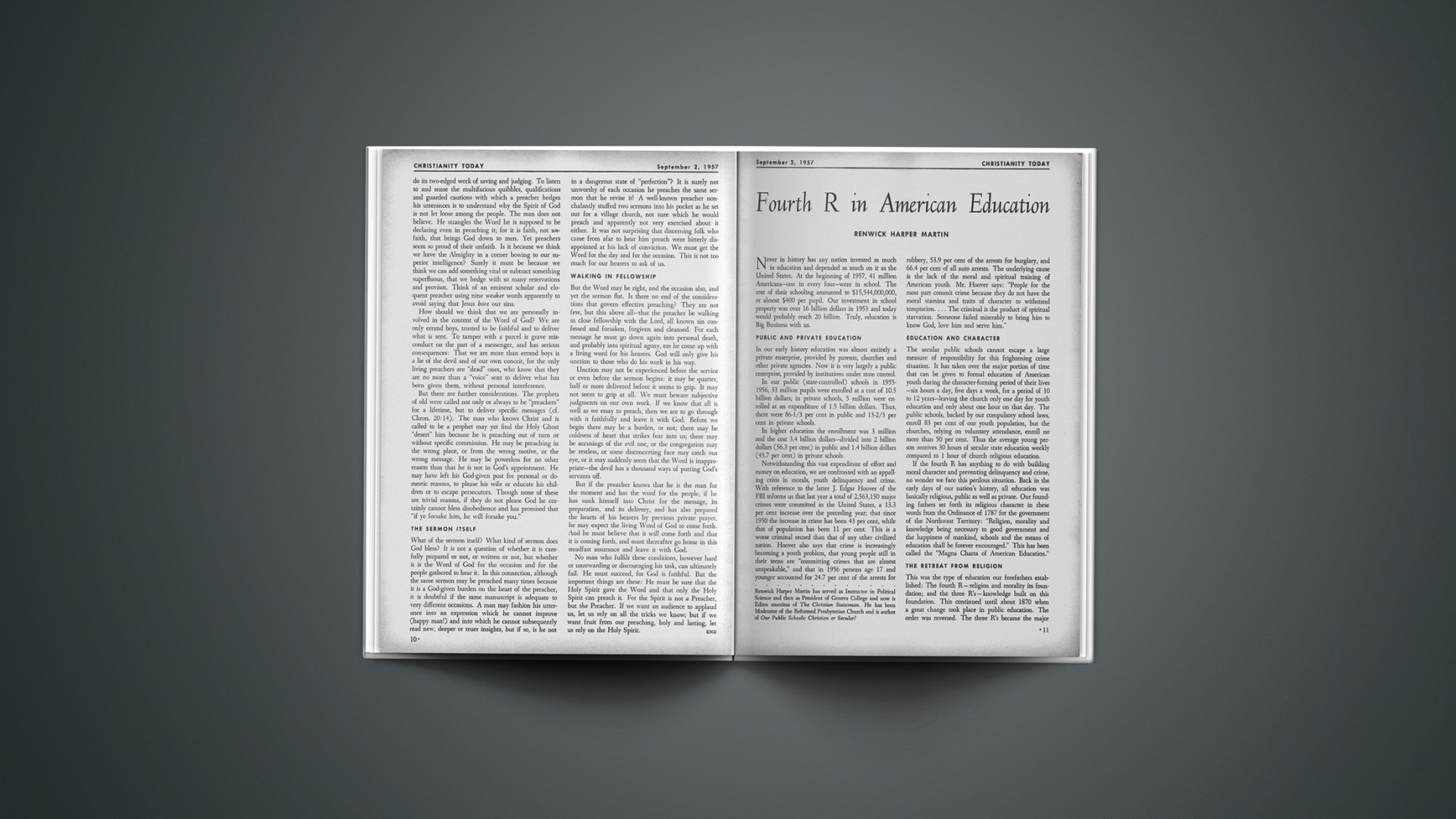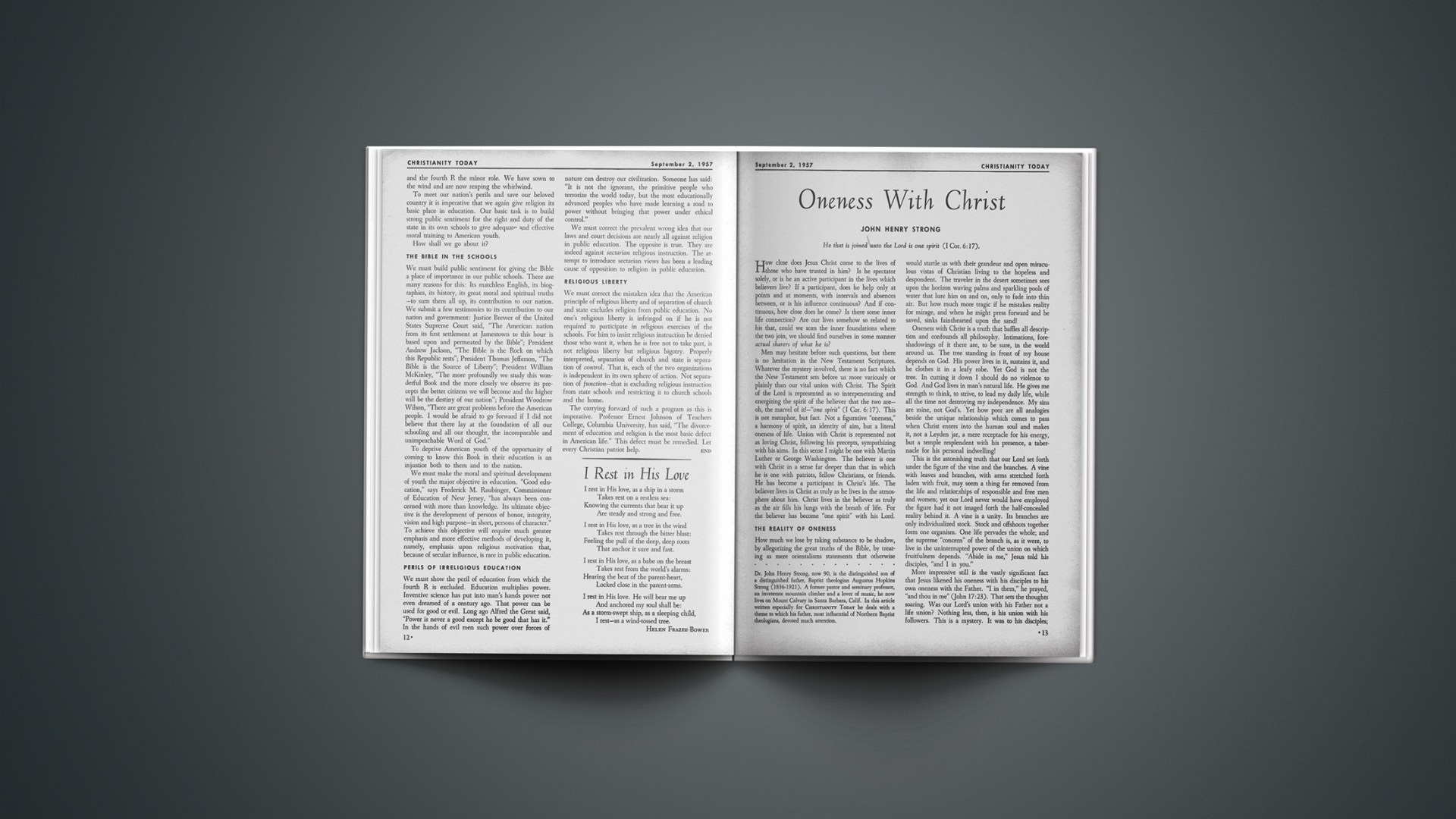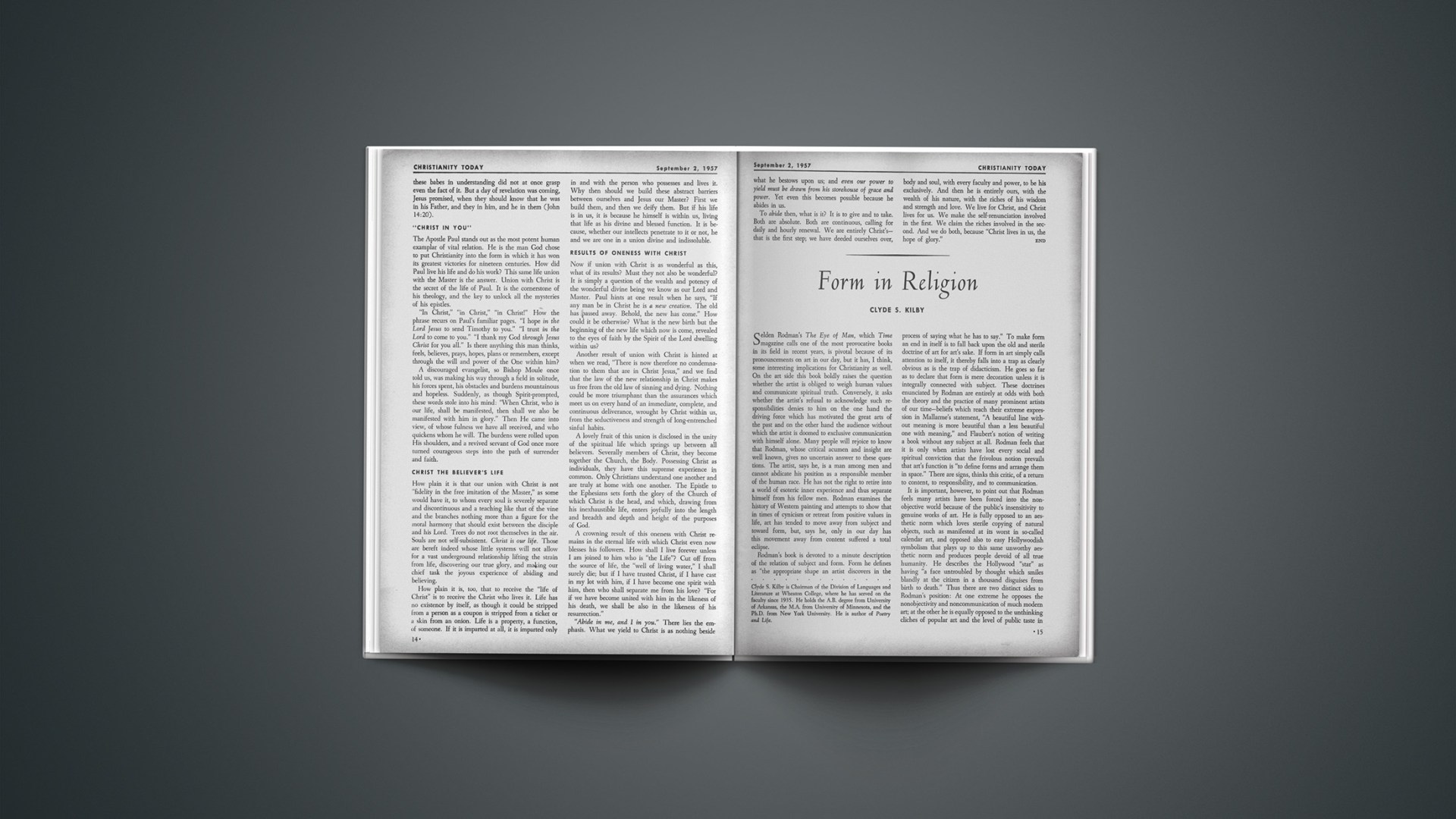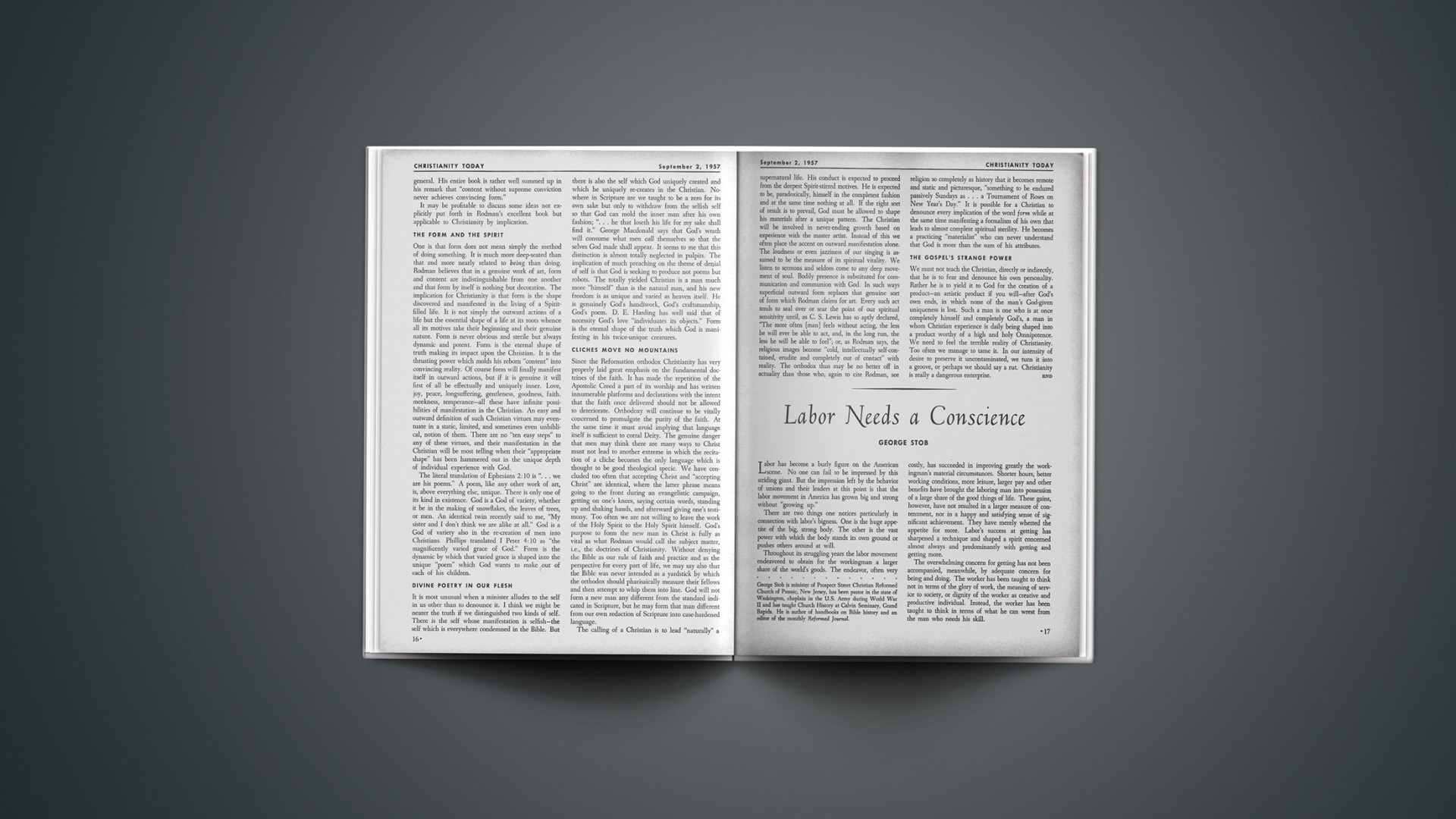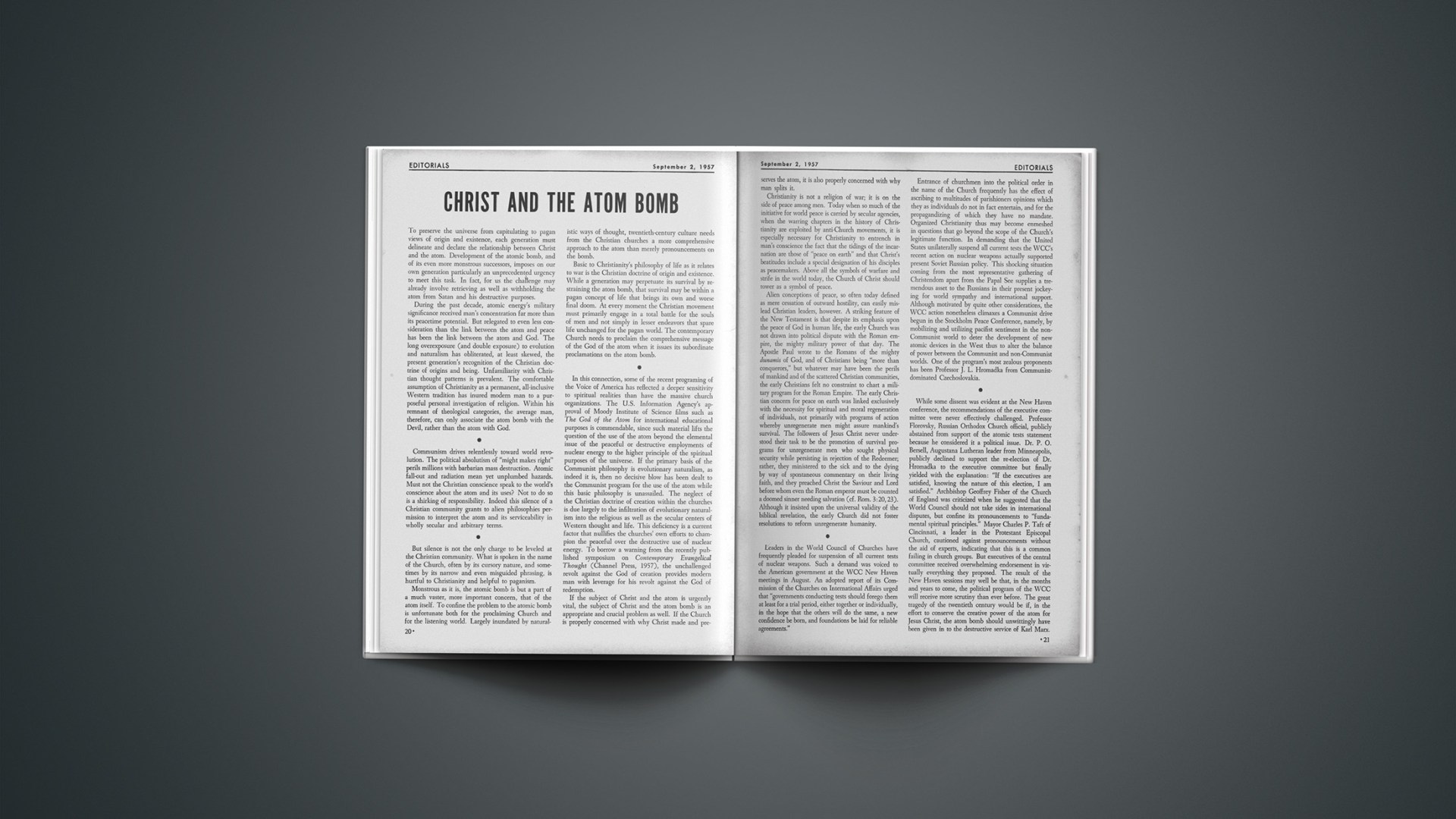One day a few months ago I opened my mail to find enclosed in a letter from a member of my church an old letter of Dwight L. Moody’s written to his grandfather. Dated Baltimore, October 27, 1878, Moody’s letter was encouraging Mr. Aitchison, sexton, prayer meeting leader, Bible teacher and later senior elder of the old Chicago Avenue Church, to seek through intensive and united prayer fresh blessing from the Holy Spirit both personally and in the work of the church. That letter, quoted below, reveals the great evangelist’s confidence that definite, believing prayer is the means to power.
My prayer is that you may be full of the Holy Spirit. Why should we not lay hold of Matthew 5:6? Surely there is a promise for us and why should we not make it real and enter into its fullness? Acts 1:8 comes to my soul over and over again and it is a mighty blessing to my soul and I trust it will be to you.
Now do you not think it will be a good thing to get all who are hungry for the same blessing together once a week in prayer? I would not give it out in the meetings, but get hold of them one at a time and if you do not get but a few you will find it a great help to you. I hope you will not rest until you get the full blessing. God has a mighty blessing for you and he can use you to do a great work.
I do want to see that church made a power in Chicago for good.
My heart thrilled because Mr. Moody’s burden almost 80 years ago for the church he founded and which now bears his name was also the present longing of my heart.
Our Great Danger
We live in days when our churches are in great danger of substituting busyness, activity, committee meetings, even evangelistic services, for men and women on their knees in travail before God. In so many cases Christian people do not recognize the fact that witness to Christ is inseparably connected with communion with Christ and prayer to God in his name. The result is that in many churches today the midweek prayer meeting has been discontinued altogether. In others it is just another church service where the members sing some hymns, offer a few trite prayers for the success of the church services, then the pastor makes announcements and delivers a small talk.
Prayer Is Warfare
Prayer is not mere prattle, it is warfare; real prayer engages in battle. That kind of prayer God answers: prayer grounded in the Word, founded on the promises and rooted in God’s past dealings. Prayer is not primarily a means of getting something done; it is a concern for the glory of God.
Every week we receive a number of requests for prayer. Is it, however, a reflection upon the general standard of our praying that virtually all of these requests center around physical needs? Seldom do we get a request to pray for a real spiritual issue, a revelation of the will of God, the glory of God in a life, the breaking through of the power of God in hearts. Our prayers are usually asking God to bless the work or to keep us plodding along.
Was prayerlessness on our part the reason that there was a lack of conviction of sinners in our services? I asked myself, were we seeking to do by program planning and committee procedure what could be accomplished only by sacrificial prayer? By that I mean praying which refuses to let go until God blesses. The disciples waited and the power came; we do not wait and the power does not come.
Among the problems that faced us constantly were lack of reality in our personal lives, lack of effectiveness in our witness, lack of effort in our prayers. What we needed were prayer warriors, a few humble, ordinary souls anointed with the fullness of God’s Spirit. That is the ministry through which God convicts of sin, transforms lives and promotes revival.
Even when we prayed, could it be that we were living and acting in such a manner that it was impossible for God to answer our prayers? We can be so aware of sin in the life of the unbeliever, or of breakdown and failure in the life of our brother or sister in Christ, when the Holy Spirit of God is trying to speak to our own hearts and convince us of the sin in our own souls. The secret of every discord in Christian homes and communities and churches is that we seek our own way and our own glory. Obedience and humility are the only attitudes through which God can hear and answer prayer. We cannot in sincerity bring our requests in the name of the Lord Jesus unless we are living so that it is possible for God in righteousness to hear and answer us. If sacrificial living and self-denial cease, then prayer becomes meaningless and righteous conduct impossible.
Some people come to church, even to prayer meeting, carrying the resentment of years, the bitterness of a lifetime, and when they ask God for blessing they wonder why their prayers are not answered. A condition of restored fellowship with Christ is a forgiving spirit and without that there can be no fellowship in prayer with one another. What separations develop, what resentments arise out of injuries and slights, real or imagined! What an appalling revelation of how we love ourselves and how important we think we are!
During the major part of my ministry at Moody Church thus far the emphasis in my preaching has been upon this need for holy living, because it is my deep conviction that only through holiness in the lives of Christians can the unsaved be challenged to come to Christ.
Times Of Refreshing
When individual lives were cleansed and principles of prayer practiced, we noticed increasing burden for prayer spreading throughout our church. We made innovations in our scheduled prayer meetings, the executive committee leading out by setting aside alternate meetings especially for prayer. We created separate prayer meetings for young people and adults and added other periods such as all-night prayer meetings and cottage prayer meetings in an attempt to enlist all the people in some kind of public prayer.
The first of our all-night prayer meetings on New Year’s Eve 1953–54 proved to be such a great time of refreshing and blessing we have had several more. Sometimes we take an hour or two of waiting upon God for special requests following a midweek service. At a night of prayer for foreign missions in connection with one of our missionary conferences the Lord drew very near to us and we were confident that our missionaries felt the impact. We shall never forget the hour spent in praying for revival in the church; truly heaven seemed to open on us and our hearts were melted—there were few dry eyes in that meeting.
Our next step was organizing groups in the homes of our people for prayer and testimony. The need for fellowship, Bible study and prayer among our scattered members was quite sufficient reason for setting up 27 districts for monthly or bi-monthly cottage meetings. Most of the groups started studying the Gospel of John, using a set of guide questions for analysis and personal application. We found this method stimulated helpful discussion and greater participation in study of the Word. A large percentage of time was devoted to ministry of intercession, and virtually all who attended took part in prayer, especially for a gracious visitation of the Holy Spirit upon all the life and ministry of the church. In many ways we witnessed the increasing impact of such prayer.
Charting A New Course
D. L. Moody suggested that Mr. Aitchison seek out one by one those whom he felt shared this burden with him and call them to prayer. I had half a mind to do that very thing, but then I remembered that we met for prayer for revival every Friday morning at seven. That was a difficult time for prayer meeting, of course—very inconvenient; it meant getting up and leaving home very early. For some people it was impossible, but the ten to twenty who came found a family-like spirit of oneness.
In January 1956 we put into operation a new plan for midweek prayer service—a supper fellowship at 5:30, prayer meeting at 6:30 and Bible study at 7:30. The response was most encouraging and the unhurried season of prayer paved the way for an evening of real blessing. By having a smaller group and a smaller room than the 7:30 service, we could hear each other’s prayers and those present felt more freedom in prayer.
However, the young people who came seemed to feel a hesitancy in praying before older people, and the next step was a separate meeting for those under 40. This proved the principle that “you can multiply by dividing,” because within a few months both groups were as large as the original group. “After a single month, the prayer meeting has become an almost indispensable part of our work week,” one young person wrote, “and we can only wonder why we hadn’t done it sooner!”
Praying To God’S Glory
But real prayer is more than just meeting together. The Lord said, “When you pray, do it not to be seen of men.” That applies to public prayer also. Unfortunately, it is all too easy for one or two people to ruin a prayer meeting and deprive others of blessings they might otherwise receive. A prayer meeting is no time for fancy phraseology, unnatural tone of voice, needless repetitions and long drawn-out prayers. Simplicity is a necessary ingredient of prayer and testimony in public gatherings. Above all, we should be thoughtful how we use the name of Deity; it is too sacred to be repeated without veneration or put in terms of human affection. We found that these principles of public prayer had to be emphasized at the beginning of each meeting and sometimes enforced.
When our praying is for his glory and our hearts are drawn together in love to God, in love to Jesus Christ and in love to each other, there is a triumphant note of victory in the church that drives out discord and brings liberty in work and worship. I find in my diary a few months back this entry: “The presence of the Lord has been very manifest today. It has been great encouragement to find our prayer meeting attended by many more people … How constantly we have to be taught that the effectual fervent prayer of a righteous man availeth much.”
“Blessed are they that hunger and thirst after righteousness, for they shall be filled,” was D. L. Moody’s conviction and the promise he claimed. Is it yours and mine?
Let us keep our chins up and our knees down—we are on the victory side!
END
The Rev. A. Dallimore, B.Th., is pastor of the Cottam Baptist Church, Cottam, Ontario, Canada. He was for some years editor of The Union Baptist and writes a monthly column for its successor, The Fellowship Baptist. He is a graduate of Central Baptist Seminary of Toronto, and for some years has been doing research on the life of Whitefield in preparation for a new biography to be called, George Whitefield and the Eighteenth Century Revival.

